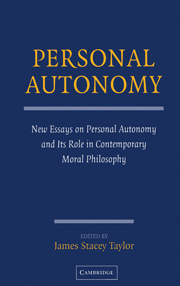Book contents
- Frontmatter
- Contents
- List of Contributors
- Acknowledgments
- Introduction
- PART I THEORETICAL APPROACHES TO PERSONAL AUTONOMY
- 1 Planning Agency, Autonomous Agency
- 2 Autonomy without Free Will
- 3 Autonomy and the Paradox of Self-Creation: Infinite Regresses, Finite Selves, and the Limits of Authenticity
- 4 Agnostic Autonomism Revisited
- 5 Feminist Intuitions and the Normative Substance of Autonomy
- 6 Autonomy and Personal Integration
- 7 Responsibility, Applied Ethics, and Complex Autonomy Theories
- PART II AUTONOMY, FREEDOM, AND MORAL RESPONSIBILITY
- PART III THE EXPANDING ROLE OF PERSONAL AUTONOMY
- Index
4 - Agnostic Autonomism Revisited
Published online by Cambridge University Press: 03 December 2009
- Frontmatter
- Contents
- List of Contributors
- Acknowledgments
- Introduction
- PART I THEORETICAL APPROACHES TO PERSONAL AUTONOMY
- 1 Planning Agency, Autonomous Agency
- 2 Autonomy without Free Will
- 3 Autonomy and the Paradox of Self-Creation: Infinite Regresses, Finite Selves, and the Limits of Authenticity
- 4 Agnostic Autonomism Revisited
- 5 Feminist Intuitions and the Normative Substance of Autonomy
- 6 Autonomy and Personal Integration
- 7 Responsibility, Applied Ethics, and Complex Autonomy Theories
- PART II AUTONOMY, FREEDOM, AND MORAL RESPONSIBILITY
- PART III THE EXPANDING ROLE OF PERSONAL AUTONOMY
- Index
Summary
Autonomy, as I understand it, is associated with a family of freedom concepts: free will, free choice, free action, and the like. In much of the philosophical literature discussed in this chapter, issues are framed in terms of freedom rather than autonomy, but we are talking about (aspects of) the same thing. Libertarians argue that determinism precludes autonomy by, for example, precluding an agent's being ultimately responsible for anything. Some compatibilist believers in autonomy argue that libertarians rely on indeterminism in a way that deprives us of autonomy-level control over our decisions. Theorists who contend that no human being is autonomous can benefit from arguments on both sides, alleging that libertarians decisively reveal the ordinary person's notion of autonomy, an incompatibilist notion, and that compatibilist critics of libertarianism show that the notion is incoherent or unsatis-fiable. Is there a way to use the resources both of libertarianism and of compatibilism in defending the following thesis: The claim that there are autonomous human beings is more credible than the claim that there are none?
I believe that the answer is “yes.” I defended that answer in Autonomous Agents. Part of my strategy was to develop an account of an ideally self-controlled agent (where self-control is understood as the contrary of akrasia [roughly, weakness of will]), to argue that even such an agent may fall short of autonomy, and to ask what may be added to ideal self-control to yield autonomy. I offered two answers, one for compatibilists and another for libertarians. I then argued that a certain disjunctive thesis involving both answers (identified in Section 4 below) is more credible than the thesis that there are no autonomous human beings.
- Type
- Chapter
- Information
- Personal AutonomyNew Essays on Personal Autonomy and its Role in Contemporary Moral Philosophy, pp. 109 - 123Publisher: Cambridge University PressPrint publication year: 2005
- 1
- Cited by



